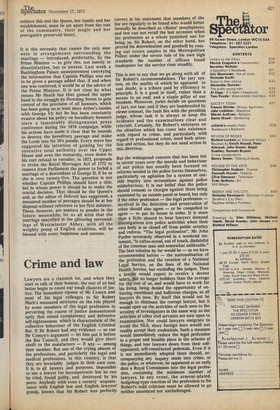Crime and law
Lawyers are a clannish lot, and when they start to talk of their honour, the rest of us had better begin to count our small chances of justice. The immediate riposte of Mr Comyn and most of his legal colleages to Sir Robert Mark's measured strictures on the role played by some members of the legal profession in perverting the course of justice demonstrated aptly that mixed complacency and defensive self-rightousness which is characteristic of the collective behaviour of the English Criminal Bar. If Sir Robert had any evidence — so ran Mr Comyn's argument — let him put it before the Bar Council, and they would give short shrift to the malefactors — if any — among their number. But one of the crying abuses of the professions, and particlarly the legal and medical professions, in this country, is that they are invariably judges in their own case. It is, to all intents and purposes, impossible to sue a lawyer for incompetence: but he can be tried, found guilty, and destroyed by his peers. Anybody with even a cursory acquaintance with English law and English lawyers' gossip, knows that Sir Robert was perfectly correct in his statement that members of the bar are regularly to be found who would better formally be described as villains' mouthpieces; and few can not recall the last occasion when the profession as a whole punished one for being so. Sir Robert, on the other hand, has .proved his determination and goodwill by rooting out rotten amples in the Metropolitan Police: under the severe rule of his own high standards the number of officers found inadequate for the service rises steadily.
This is not to say that we go along with all of Sir Robert's recommendations. The jury system, on the misfits of which he appeared to cast doubt, is a tribute paid by efficiency to principle. It is a good in itself, rather than a means to an end; and a staple pillar of our freedom. Moreover, juries decide on questions of fact, not law; and if they are bamboozled by clever counsel, the fault lies with the presiding judge, whose task it is always to keep the evidence and the examinations clear and relevant. Certainly, Sir Robert's strictures on the situation which has come into existence with regard to crime, and particularly with regard to professional crime, need both attention and action, but they do not need action in this direction.
But the widespread concern that has been felt in recent years over the morale and behaviour of our police has usually been focused on reforms needed in the police forces themselves, particularly on agitation for a system of out side inquiry into accusations against police misbehaviour. It is our belief that the police should consent to charges against them being examined by an outside panel or board, but only if the other profession — the legal profession — involved in the detection and prosecution of crime should also agree — or be compelled to agree — to put its house in order. It is more than a little absurd to hear lawyers demand investigations icto police activities when their own body is so closed off from public scrutiny and redress. "The legal profession", Mr John Pardoe accurately observed in a weekend statement, "is toffee-nosed, out of touch, disdainful of the common man and somewhat unlikeable." The best solution by far would be — as we have recommended before — the nationalisation of the profession and the creation of a National Legal Service, on the lines of the National Health Service, but excluding the judges. Then a lawyer would expect to receive a decent salary, but no longer holidays than the average for the rest of us, and would have to work for his living, being denied the opportunity of enforcing exorbitant and ludicrous charges, as all lawyers do now. By itself this would not be enough to eliminate the corrupt lawyer, but it would open up the activities of such men to the scrutiny of investigators in the same way as the activities of other civil servants are now open to examination. Nor could lawyers emigrate to avoid the NLS, since foreign bars would not readily accept their credentials. Such a measure would immediately reduce the legal profession to a proper and humble place in the scheme of things, and tear lawyers down from their selfappointed, self-constructed pedestals. Even if it is not immediately adopted there should, accompanying any inquiry made into crime, or the police, or whatever, be appointed at an early date a Royal Commission into the legal profession, containing the minimum number of lawyers. In any event, the armour-plated, hedgehog-type reaction of the profession to Sir Robert's mild criticism must be allowed to go neither unnoticed nor unchallenged.


































 Previous page
Previous page